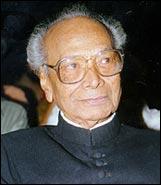Here is an intersting Article...
If you are Naushad's fan tell us which is ur fav song of his and why??
My fav song is from Mughal e aazam
Mohe pan gahte pe nandlala😊😊
Naushad's five favourite songs
Picking the top tunes from the repertoire of such a legendary composer is difficult. I made an attempt though.
One: Bekas Par Rahem Kijiye Sarkare Madina from Mughal-E-Azam.
The reason is the lyrics and minimal music. People may rave about the song Pyaar Kiya Toh Darna Kya from the same film, but the fact is this song is more beautifully composed: Bekas Par Rahem Kijiye Sarkare Madina, Mushkil Mein Hai Takdeer, Bhawar Mein Hai Safina (Help the helpless, Oh! Prophet of Medina, My future is in trouble and my ship is caught in whirlpool).
Unfortunately, the track was not included in the colour version of Mughal-E-Azam released in 2004.
Two: Aiye Husn Zara Jaag Tujhe Ishq Jagaye from Mere Mehboob.
The song is played when Rajendra Kumar drops by Ashok Kumar's residence. His sister Sadhna -- who looks gorgeous in the film -- is asleep in the other room when he sits on the piano and begins crooning. Kumar pleads: Aiye Husn Zara Jaag Tujhe Ishq Jagaye, Badle Meri Taqdeer Jo Tu Hosh Mein Aaye. (Oh beautiful woman, please wake up. My fate will change once you do).
A must hear.
Three: Mere Mehboob: Title track.
An all-time favourite for the romantic in search of their love. The song is about 5 minutes long, with almost no accompanying music. Rafi's voice is enchanting and, with no major instruments playing, the camera catches Sadhna and Rajendra Kumar, who is singing on stage at a college function.
Naushad obviously knew when to use instruments and when not to.
Four: Dil-E-Nadaan: Mirza Ghalib
Sung by actress Suraiya, this is one of her most remembered tracks. Mirza Ghalib wrote the lyrics in the nineteenth century. Loosely translated, it means: 'What has happened to you, oh my heart? What is the cure for this disease, love? I am dying to see my beloved, but is she bored of me? Oh God! What is this thing that has come up between us?'
Naushad heard Suraiya's voice for the first time on the radio and chose her to sing for Kardar's Sharda (1942). Mirza Ghalib won the President's gold medal. Pandit Jawaharlal Nehru complimented Suraiya saying "Tumne Mirza Ghalib ki rooh ko zinda kar diya…"
Five: Madhuban Mein Radhika Nache: Kohinoor.
Simply beyond compare. There are rare examples of a musician blending a classical song so well in commercial cinema. This track also tells us why Mohammad Rafi is one of the greatest singers of Indian cinema. Few others could touch the depth he did, and it is all because of Naushad.
Source : http://gullugupshup.rediffiland.com//scripts/xanadu_diary_vi ew.php?postId=1146831445


























